Medical Surgical Nursing: Skills, Standards, and Competencies Report
VerifiedAdded on 2023/06/10
|7
|1597
|74
Report
AI Summary
This report delves into the multifaceted role of medical surgical nurses, emphasizing the evolution of the specialty and the essential skills required for success. It highlights the shift from medical surgical nursing as an entry-level position to a distinct specialty, outlining the diverse settings in which licensed medical surgical nurses practice, including inpatient clinics, emergency departments, and home health care. The report stresses the importance of master coordination, critical thinking, and vast knowledge of body systems and diseases. It underscores the need for nurses to develop high-level management skills while maintaining composure under pressure. The report also highlights the significance of adhering to NMBA competency standards, coordinating complex client assignments, and integrating technological advancements and research into patient care. It concludes by emphasizing the need for aspiring professionals to develop comprehensive skills to excel in the field, from patient admission to discharge, while upholding ethical and legal frameworks.
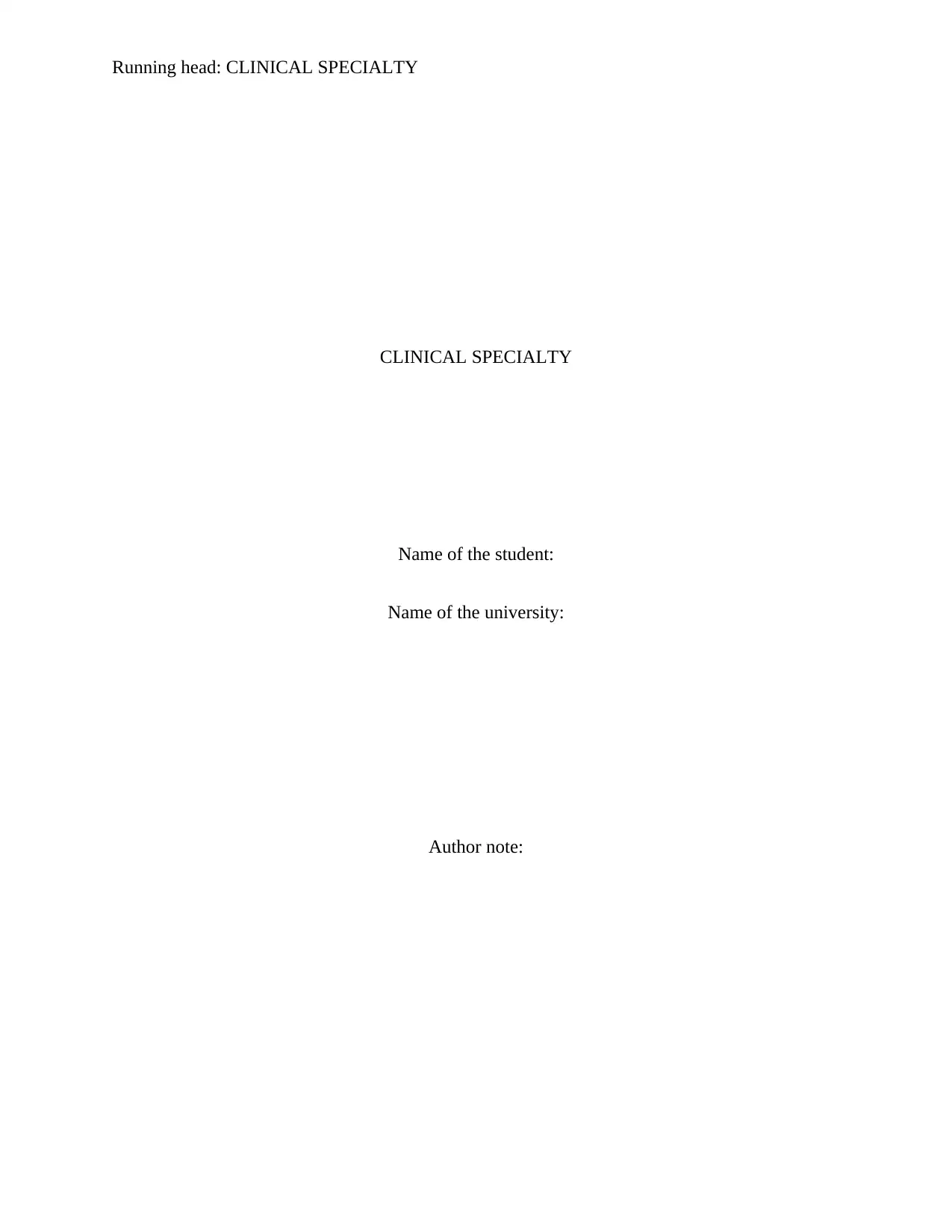
Running head: CLINICAL SPECIALTY
CLINICAL SPECIALTY
Name of the student:
Name of the university:
Author note:
CLINICAL SPECIALTY
Name of the student:
Name of the university:
Author note:
Paraphrase This Document
Need a fresh take? Get an instant paraphrase of this document with our AI Paraphraser
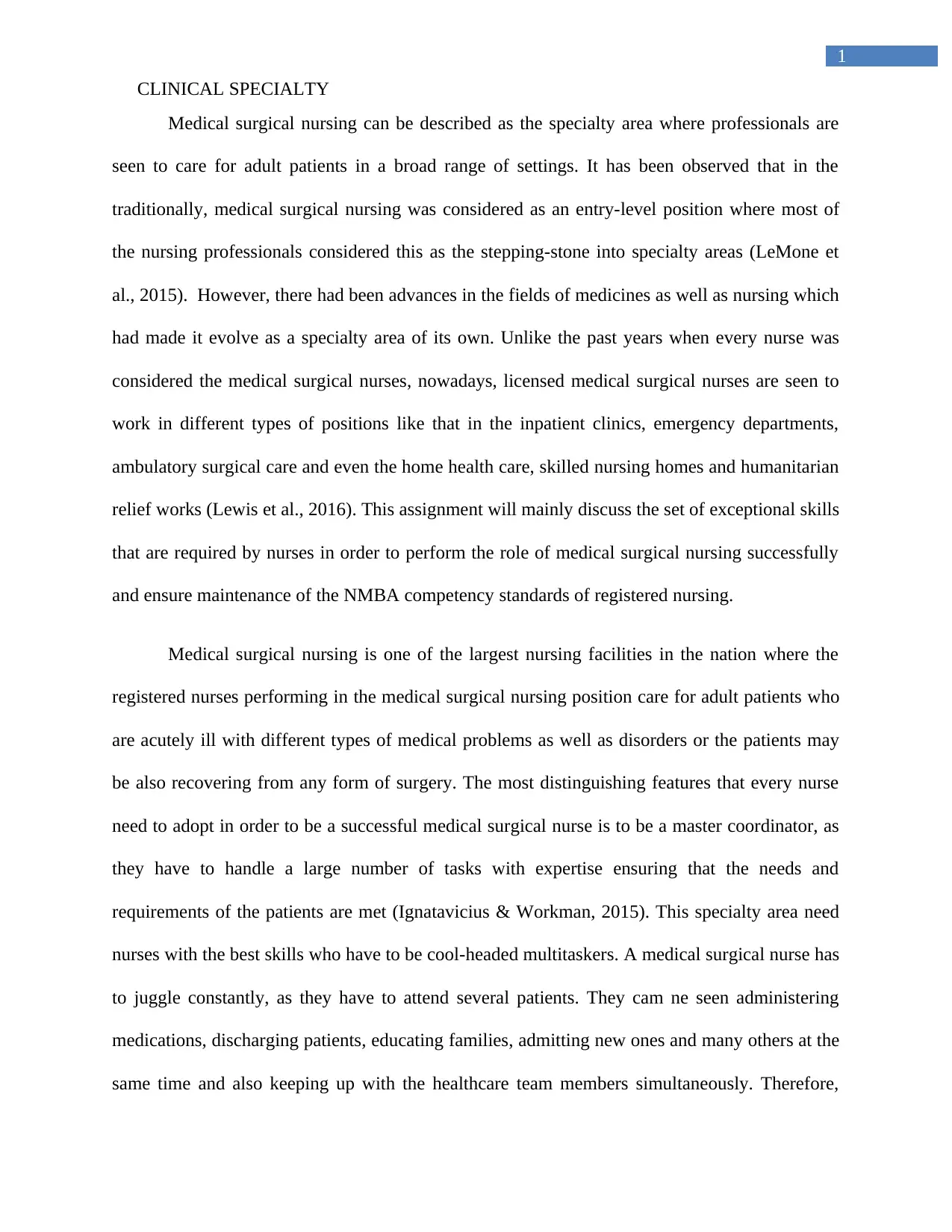
1
CLINICAL SPECIALTY
Medical surgical nursing can be described as the specialty area where professionals are
seen to care for adult patients in a broad range of settings. It has been observed that in the
traditionally, medical surgical nursing was considered as an entry-level position where most of
the nursing professionals considered this as the stepping-stone into specialty areas (LeMone et
al., 2015). However, there had been advances in the fields of medicines as well as nursing which
had made it evolve as a specialty area of its own. Unlike the past years when every nurse was
considered the medical surgical nurses, nowadays, licensed medical surgical nurses are seen to
work in different types of positions like that in the inpatient clinics, emergency departments,
ambulatory surgical care and even the home health care, skilled nursing homes and humanitarian
relief works (Lewis et al., 2016). This assignment will mainly discuss the set of exceptional skills
that are required by nurses in order to perform the role of medical surgical nursing successfully
and ensure maintenance of the NMBA competency standards of registered nursing.
Medical surgical nursing is one of the largest nursing facilities in the nation where the
registered nurses performing in the medical surgical nursing position care for adult patients who
are acutely ill with different types of medical problems as well as disorders or the patients may
be also recovering from any form of surgery. The most distinguishing features that every nurse
need to adopt in order to be a successful medical surgical nurse is to be a master coordinator, as
they have to handle a large number of tasks with expertise ensuring that the needs and
requirements of the patients are met (Ignatavicius & Workman, 2015). This specialty area need
nurses with the best skills who have to be cool-headed multitaskers. A medical surgical nurse has
to juggle constantly, as they have to attend several patients. They cam ne seen administering
medications, discharging patients, educating families, admitting new ones and many others at the
same time and also keeping up with the healthcare team members simultaneously. Therefore,
CLINICAL SPECIALTY
Medical surgical nursing can be described as the specialty area where professionals are
seen to care for adult patients in a broad range of settings. It has been observed that in the
traditionally, medical surgical nursing was considered as an entry-level position where most of
the nursing professionals considered this as the stepping-stone into specialty areas (LeMone et
al., 2015). However, there had been advances in the fields of medicines as well as nursing which
had made it evolve as a specialty area of its own. Unlike the past years when every nurse was
considered the medical surgical nurses, nowadays, licensed medical surgical nurses are seen to
work in different types of positions like that in the inpatient clinics, emergency departments,
ambulatory surgical care and even the home health care, skilled nursing homes and humanitarian
relief works (Lewis et al., 2016). This assignment will mainly discuss the set of exceptional skills
that are required by nurses in order to perform the role of medical surgical nursing successfully
and ensure maintenance of the NMBA competency standards of registered nursing.
Medical surgical nursing is one of the largest nursing facilities in the nation where the
registered nurses performing in the medical surgical nursing position care for adult patients who
are acutely ill with different types of medical problems as well as disorders or the patients may
be also recovering from any form of surgery. The most distinguishing features that every nurse
need to adopt in order to be a successful medical surgical nurse is to be a master coordinator, as
they have to handle a large number of tasks with expertise ensuring that the needs and
requirements of the patients are met (Ignatavicius & Workman, 2015). This specialty area need
nurses with the best skills who have to be cool-headed multitaskers. A medical surgical nurse has
to juggle constantly, as they have to attend several patients. They cam ne seen administering
medications, discharging patients, educating families, admitting new ones and many others at the
same time and also keeping up with the healthcare team members simultaneously. Therefore,
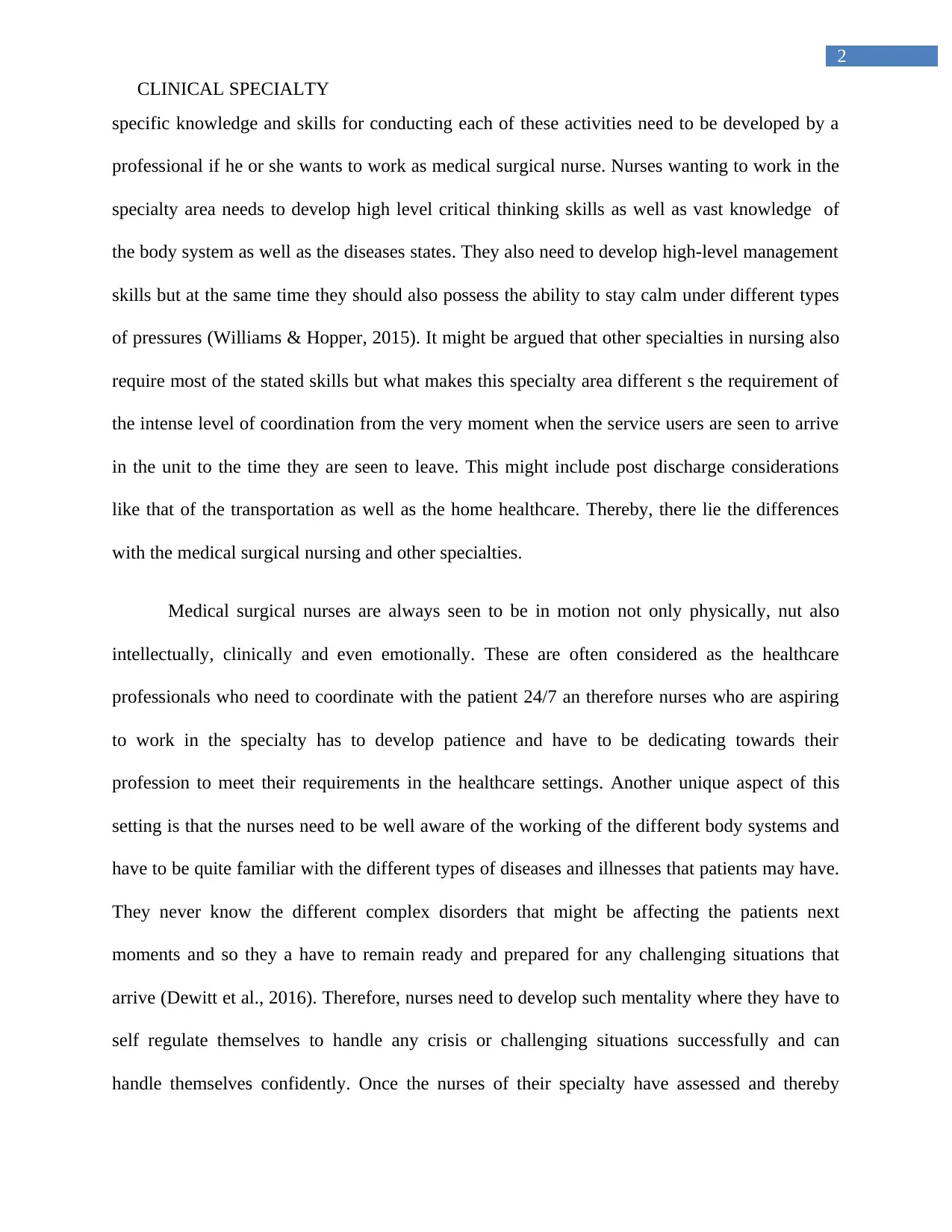
2
CLINICAL SPECIALTY
specific knowledge and skills for conducting each of these activities need to be developed by a
professional if he or she wants to work as medical surgical nurse. Nurses wanting to work in the
specialty area needs to develop high level critical thinking skills as well as vast knowledge of
the body system as well as the diseases states. They also need to develop high-level management
skills but at the same time they should also possess the ability to stay calm under different types
of pressures (Williams & Hopper, 2015). It might be argued that other specialties in nursing also
require most of the stated skills but what makes this specialty area different s the requirement of
the intense level of coordination from the very moment when the service users are seen to arrive
in the unit to the time they are seen to leave. This might include post discharge considerations
like that of the transportation as well as the home healthcare. Thereby, there lie the differences
with the medical surgical nursing and other specialties.
Medical surgical nurses are always seen to be in motion not only physically, nut also
intellectually, clinically and even emotionally. These are often considered as the healthcare
professionals who need to coordinate with the patient 24/7 an therefore nurses who are aspiring
to work in the specialty has to develop patience and have to be dedicating towards their
profession to meet their requirements in the healthcare settings. Another unique aspect of this
setting is that the nurses need to be well aware of the working of the different body systems and
have to be quite familiar with the different types of diseases and illnesses that patients may have.
They never know the different complex disorders that might be affecting the patients next
moments and so they a have to remain ready and prepared for any challenging situations that
arrive (Dewitt et al., 2016). Therefore, nurses need to develop such mentality where they have to
self regulate themselves to handle any crisis or challenging situations successfully and can
handle themselves confidently. Once the nurses of their specialty have assessed and thereby
CLINICAL SPECIALTY
specific knowledge and skills for conducting each of these activities need to be developed by a
professional if he or she wants to work as medical surgical nurse. Nurses wanting to work in the
specialty area needs to develop high level critical thinking skills as well as vast knowledge of
the body system as well as the diseases states. They also need to develop high-level management
skills but at the same time they should also possess the ability to stay calm under different types
of pressures (Williams & Hopper, 2015). It might be argued that other specialties in nursing also
require most of the stated skills but what makes this specialty area different s the requirement of
the intense level of coordination from the very moment when the service users are seen to arrive
in the unit to the time they are seen to leave. This might include post discharge considerations
like that of the transportation as well as the home healthcare. Thereby, there lie the differences
with the medical surgical nursing and other specialties.
Medical surgical nurses are always seen to be in motion not only physically, nut also
intellectually, clinically and even emotionally. These are often considered as the healthcare
professionals who need to coordinate with the patient 24/7 an therefore nurses who are aspiring
to work in the specialty has to develop patience and have to be dedicating towards their
profession to meet their requirements in the healthcare settings. Another unique aspect of this
setting is that the nurses need to be well aware of the working of the different body systems and
have to be quite familiar with the different types of diseases and illnesses that patients may have.
They never know the different complex disorders that might be affecting the patients next
moments and so they a have to remain ready and prepared for any challenging situations that
arrive (Dewitt et al., 2016). Therefore, nurses need to develop such mentality where they have to
self regulate themselves to handle any crisis or challenging situations successfully and can
handle themselves confidently. Once the nurses of their specialty have assessed and thereby
⊘ This is a preview!⊘
Do you want full access?
Subscribe today to unlock all pages.

Trusted by 1+ million students worldwide
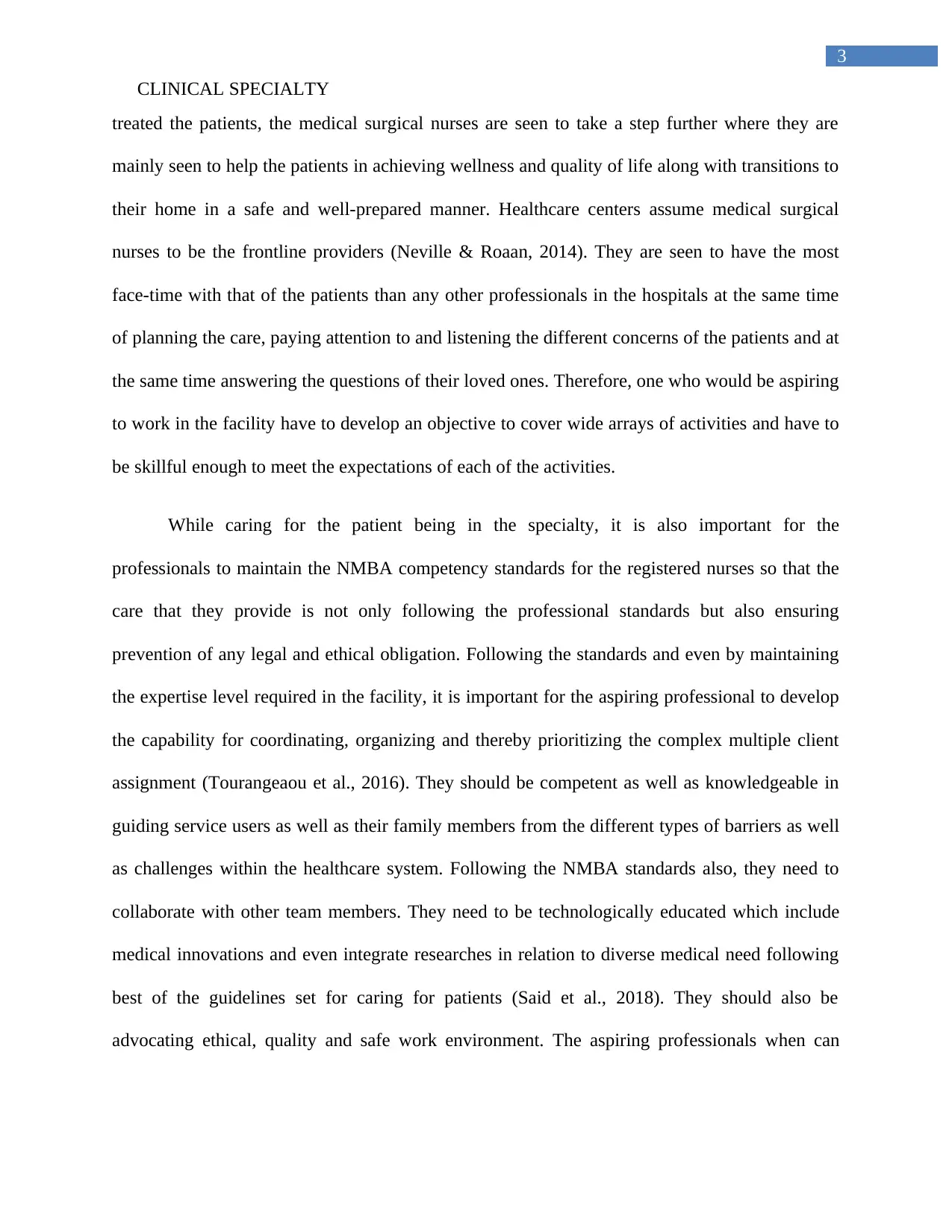
3
CLINICAL SPECIALTY
treated the patients, the medical surgical nurses are seen to take a step further where they are
mainly seen to help the patients in achieving wellness and quality of life along with transitions to
their home in a safe and well-prepared manner. Healthcare centers assume medical surgical
nurses to be the frontline providers (Neville & Roaan, 2014). They are seen to have the most
face-time with that of the patients than any other professionals in the hospitals at the same time
of planning the care, paying attention to and listening the different concerns of the patients and at
the same time answering the questions of their loved ones. Therefore, one who would be aspiring
to work in the facility have to develop an objective to cover wide arrays of activities and have to
be skillful enough to meet the expectations of each of the activities.
While caring for the patient being in the specialty, it is also important for the
professionals to maintain the NMBA competency standards for the registered nurses so that the
care that they provide is not only following the professional standards but also ensuring
prevention of any legal and ethical obligation. Following the standards and even by maintaining
the expertise level required in the facility, it is important for the aspiring professional to develop
the capability for coordinating, organizing and thereby prioritizing the complex multiple client
assignment (Tourangeaou et al., 2016). They should be competent as well as knowledgeable in
guiding service users as well as their family members from the different types of barriers as well
as challenges within the healthcare system. Following the NMBA standards also, they need to
collaborate with other team members. They need to be technologically educated which include
medical innovations and even integrate researches in relation to diverse medical need following
best of the guidelines set for caring for patients (Said et al., 2018). They should also be
advocating ethical, quality and safe work environment. The aspiring professionals when can
CLINICAL SPECIALTY
treated the patients, the medical surgical nurses are seen to take a step further where they are
mainly seen to help the patients in achieving wellness and quality of life along with transitions to
their home in a safe and well-prepared manner. Healthcare centers assume medical surgical
nurses to be the frontline providers (Neville & Roaan, 2014). They are seen to have the most
face-time with that of the patients than any other professionals in the hospitals at the same time
of planning the care, paying attention to and listening the different concerns of the patients and at
the same time answering the questions of their loved ones. Therefore, one who would be aspiring
to work in the facility have to develop an objective to cover wide arrays of activities and have to
be skillful enough to meet the expectations of each of the activities.
While caring for the patient being in the specialty, it is also important for the
professionals to maintain the NMBA competency standards for the registered nurses so that the
care that they provide is not only following the professional standards but also ensuring
prevention of any legal and ethical obligation. Following the standards and even by maintaining
the expertise level required in the facility, it is important for the aspiring professional to develop
the capability for coordinating, organizing and thereby prioritizing the complex multiple client
assignment (Tourangeaou et al., 2016). They should be competent as well as knowledgeable in
guiding service users as well as their family members from the different types of barriers as well
as challenges within the healthcare system. Following the NMBA standards also, they need to
collaborate with other team members. They need to be technologically educated which include
medical innovations and even integrate researches in relation to diverse medical need following
best of the guidelines set for caring for patients (Said et al., 2018). They should also be
advocating ethical, quality and safe work environment. The aspiring professionals when can
Paraphrase This Document
Need a fresh take? Get an instant paraphrase of this document with our AI Paraphraser
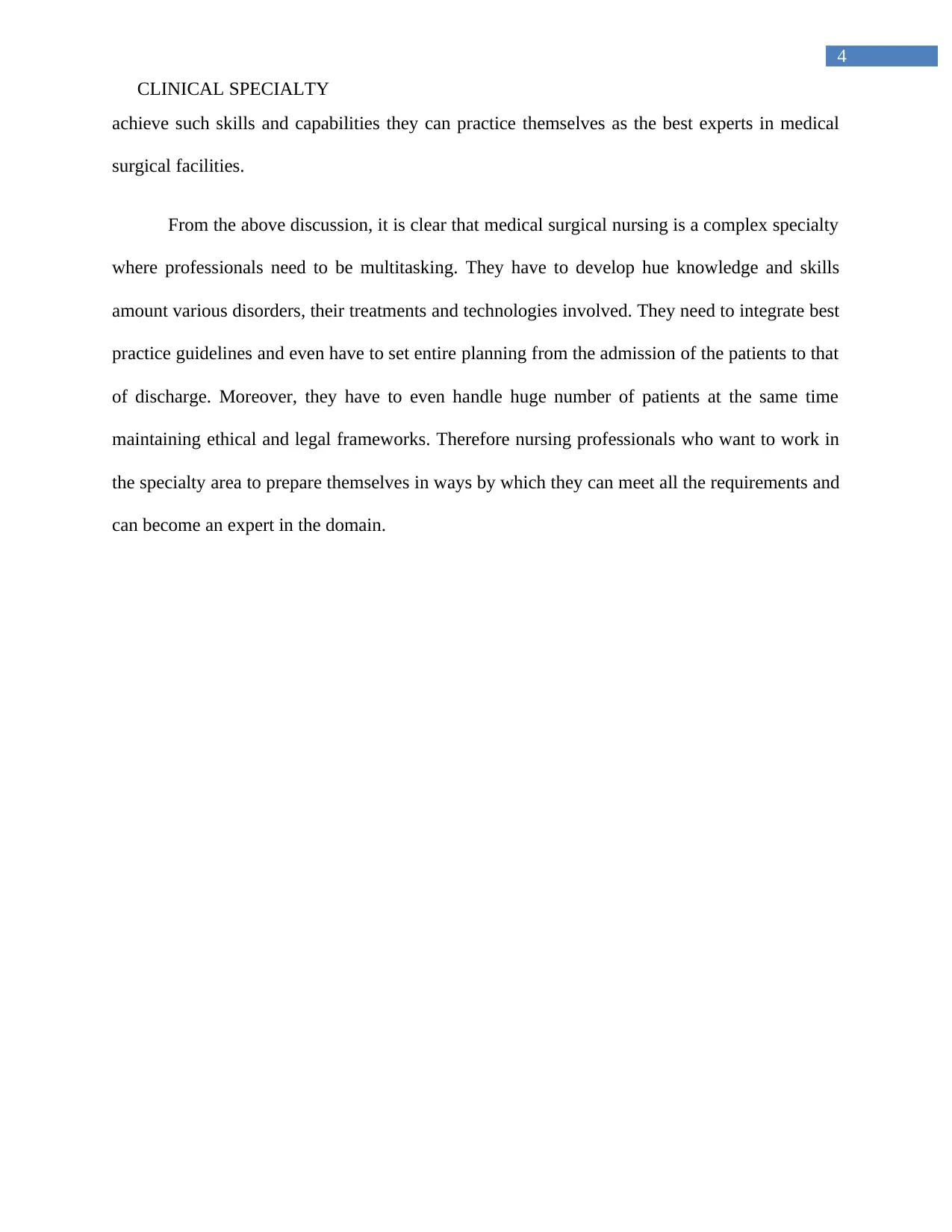
4
CLINICAL SPECIALTY
achieve such skills and capabilities they can practice themselves as the best experts in medical
surgical facilities.
From the above discussion, it is clear that medical surgical nursing is a complex specialty
where professionals need to be multitasking. They have to develop hue knowledge and skills
amount various disorders, their treatments and technologies involved. They need to integrate best
practice guidelines and even have to set entire planning from the admission of the patients to that
of discharge. Moreover, they have to even handle huge number of patients at the same time
maintaining ethical and legal frameworks. Therefore nursing professionals who want to work in
the specialty area to prepare themselves in ways by which they can meet all the requirements and
can become an expert in the domain.
CLINICAL SPECIALTY
achieve such skills and capabilities they can practice themselves as the best experts in medical
surgical facilities.
From the above discussion, it is clear that medical surgical nursing is a complex specialty
where professionals need to be multitasking. They have to develop hue knowledge and skills
amount various disorders, their treatments and technologies involved. They need to integrate best
practice guidelines and even have to set entire planning from the admission of the patients to that
of discharge. Moreover, they have to even handle huge number of patients at the same time
maintaining ethical and legal frameworks. Therefore nursing professionals who want to work in
the specialty area to prepare themselves in ways by which they can meet all the requirements and
can become an expert in the domain.
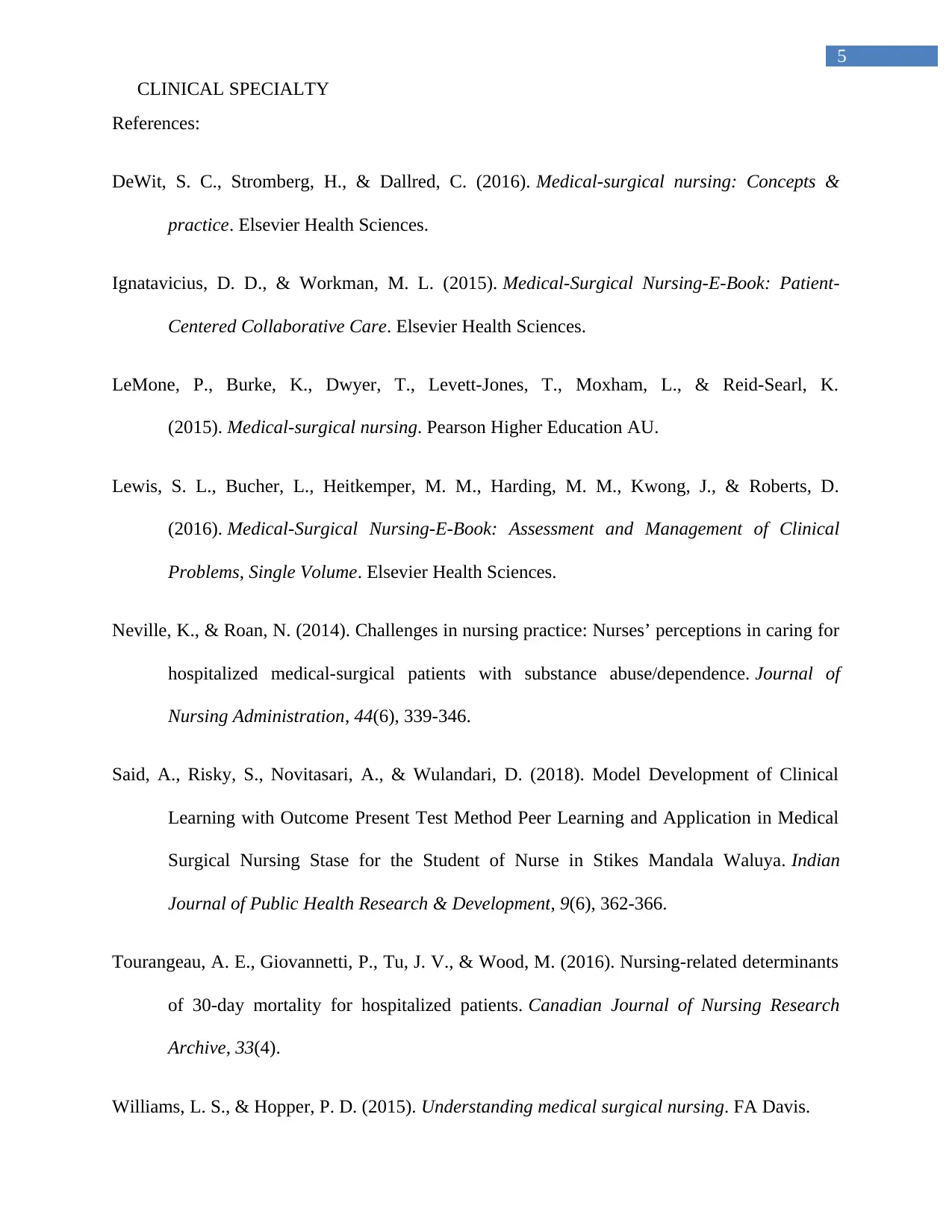
5
CLINICAL SPECIALTY
References:
DeWit, S. C., Stromberg, H., & Dallred, C. (2016). Medical-surgical nursing: Concepts &
practice. Elsevier Health Sciences.
Ignatavicius, D. D., & Workman, M. L. (2015). Medical-Surgical Nursing-E-Book: Patient-
Centered Collaborative Care. Elsevier Health Sciences.
LeMone, P., Burke, K., Dwyer, T., Levett-Jones, T., Moxham, L., & Reid-Searl, K.
(2015). Medical-surgical nursing. Pearson Higher Education AU.
Lewis, S. L., Bucher, L., Heitkemper, M. M., Harding, M. M., Kwong, J., & Roberts, D.
(2016). Medical-Surgical Nursing-E-Book: Assessment and Management of Clinical
Problems, Single Volume. Elsevier Health Sciences.
Neville, K., & Roan, N. (2014). Challenges in nursing practice: Nurses’ perceptions in caring for
hospitalized medical-surgical patients with substance abuse/dependence. Journal of
Nursing Administration, 44(6), 339-346.
Said, A., Risky, S., Novitasari, A., & Wulandari, D. (2018). Model Development of Clinical
Learning with Outcome Present Test Method Peer Learning and Application in Medical
Surgical Nursing Stase for the Student of Nurse in Stikes Mandala Waluya. Indian
Journal of Public Health Research & Development, 9(6), 362-366.
Tourangeau, A. E., Giovannetti, P., Tu, J. V., & Wood, M. (2016). Nursing-related determinants
of 30-day mortality for hospitalized patients. Canadian Journal of Nursing Research
Archive, 33(4).
Williams, L. S., & Hopper, P. D. (2015). Understanding medical surgical nursing. FA Davis.
CLINICAL SPECIALTY
References:
DeWit, S. C., Stromberg, H., & Dallred, C. (2016). Medical-surgical nursing: Concepts &
practice. Elsevier Health Sciences.
Ignatavicius, D. D., & Workman, M. L. (2015). Medical-Surgical Nursing-E-Book: Patient-
Centered Collaborative Care. Elsevier Health Sciences.
LeMone, P., Burke, K., Dwyer, T., Levett-Jones, T., Moxham, L., & Reid-Searl, K.
(2015). Medical-surgical nursing. Pearson Higher Education AU.
Lewis, S. L., Bucher, L., Heitkemper, M. M., Harding, M. M., Kwong, J., & Roberts, D.
(2016). Medical-Surgical Nursing-E-Book: Assessment and Management of Clinical
Problems, Single Volume. Elsevier Health Sciences.
Neville, K., & Roan, N. (2014). Challenges in nursing practice: Nurses’ perceptions in caring for
hospitalized medical-surgical patients with substance abuse/dependence. Journal of
Nursing Administration, 44(6), 339-346.
Said, A., Risky, S., Novitasari, A., & Wulandari, D. (2018). Model Development of Clinical
Learning with Outcome Present Test Method Peer Learning and Application in Medical
Surgical Nursing Stase for the Student of Nurse in Stikes Mandala Waluya. Indian
Journal of Public Health Research & Development, 9(6), 362-366.
Tourangeau, A. E., Giovannetti, P., Tu, J. V., & Wood, M. (2016). Nursing-related determinants
of 30-day mortality for hospitalized patients. Canadian Journal of Nursing Research
Archive, 33(4).
Williams, L. S., & Hopper, P. D. (2015). Understanding medical surgical nursing. FA Davis.
⊘ This is a preview!⊘
Do you want full access?
Subscribe today to unlock all pages.

Trusted by 1+ million students worldwide
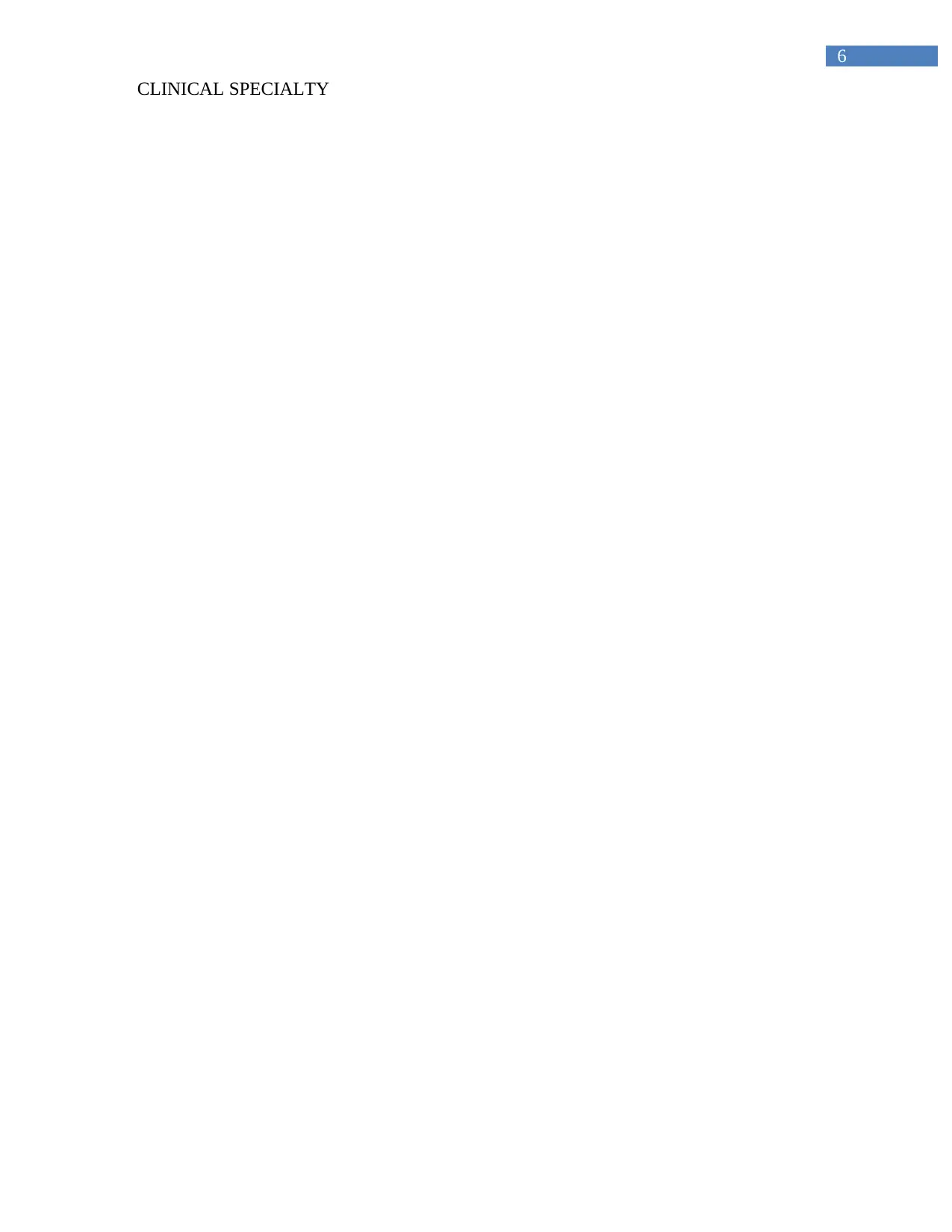
6
CLINICAL SPECIALTY
CLINICAL SPECIALTY
1 out of 7
Related Documents
Your All-in-One AI-Powered Toolkit for Academic Success.
+13062052269
info@desklib.com
Available 24*7 on WhatsApp / Email
![[object Object]](/_next/static/media/star-bottom.7253800d.svg)
Unlock your academic potential
Copyright © 2020–2026 A2Z Services. All Rights Reserved. Developed and managed by ZUCOL.





